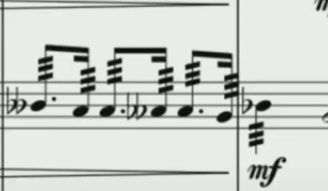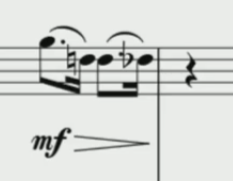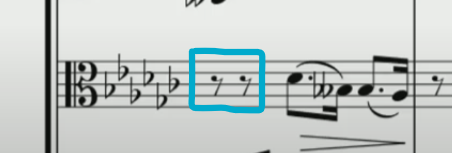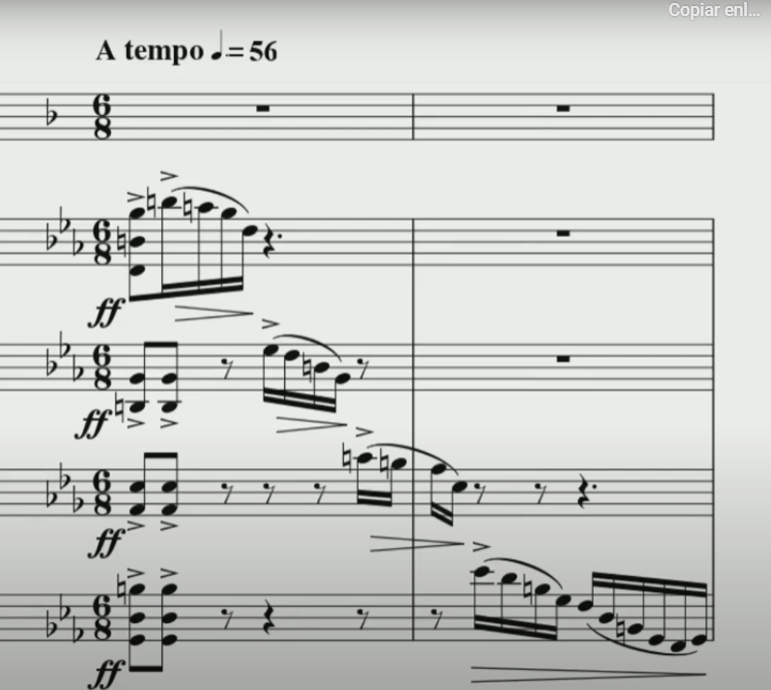Leaderboard
Popular Content
Showing content with the highest reputation on 01/24/2023 in all areas
-
I just completed a piece for clarinet and piano. I would be very interested in getting your comments. There is probably still a need for some revision (spelling issues, slurring etc.). I am particularly interested to know about the potential playability of this piece. I am looking forward to your feedback!1 point
-
Hello! I'm very new to this platform, but I am a young composer who thought I might find some good feedback and interactions here. Here is my first submission; a short little 'aria' for organ that I have been working on for the last couple of days. It is perhaps more conventional, harmonically and otherwise, than some of my other works. I took direct inspiration from Noel Rawsthorne's 'Aria' (which I am currently learning myself) in many features of the piece, particularly the form and structure. A computer playback version will have to do for now, I'm afraid, but I will try and record this myself when I go in to my local church for some organ practice this week. I hope my registration instructions and our imaginations will be able to overcome the registration of this synthesized version, particularly in the computer's conservative interpretation of ritardandos. Any feedback or suggestions are very welcome!1 point
-
Never ask forgiveness for telling the truth, my friend.1 point
-
A TV show intro theme I composed inspired by Star Trek, Stargate, and the other usual Star suspects. Let me know what you think of it!1 point
-
I pretty much only dealt with indie projects on a licensed, non-exclusive basis. So yes, these tracks will also be able to use for a fee. The deal I usually worked with indie projects, even if it's commissioned is that I keep 100% of the rights to the music and recordings, so that if the project fails (or even if it doesn't) I'm not out anything and the music can continue to be used. Back in the day, I made the mistake of signing away rights to projects that never got released, and so there's all this music I can't do anything with now and have nothing to show for all that work. Frankly, a film director, game company, advertising agency, etc. would have to be coming to me with pretty serious money and a proven track record in order for me to consider doing an exclusive deal. I definitely think that, if you're going to compose for TV and games or whatever, you should view your music as an asset that you're investing in rather than a mere commodity.1 point
-
I think this linkage of ideas with music comes from the trend of programmatic music: Liszt's tone poems and Wagner's leitmotif all put ideas with music. Or in the religious music and word painting. But the composers cared for the aesthetic aspect of music, the modernist, on the other hand, put more time on the idea. I do think it's the drawback of contemporary art: The aesthetic content of the art is more and more replaced by the idea and interpretation. I always think that, if I want idea, why don't I read poems, novels and essays?! The crucial thing of art is to create high standards of aesthetics, then is to use that beauty to bring out the idealistic truth, but not the other way round. Those music which promotes propaganda is bullshit, forgive my language.1 point
-
Actually will you consider making them paid soundtrack even if they are not commisoned? They are very high quality and I think many will be interested. Or you just want to share it? I think money-wise this can help you fianancially, but I know you write just for fun. It seems that my suggestion is too utilitarian, but I think you deserve that!1 point
-
Greece is still Europe. Just because you can theoretically say that "X has it's possible progenitors somewhere else" doesn't mean you didn't invent anything. The Greeks invented basically everything noteworthy in antiquity. Also my people, had their own alphabet before we had the Roman alphabet. Most people were illiterate for centuries. You can speak just fine and have an advanced vocabulary without knowing how to spell. The English language is garbage in the Roman alphabet we're using, but it suits German much better. In English, you have to know how every word is spelled ahead of time, and there is minimal logic or relation to phonetics. "Money" and "Funny" are pronounced the same, but spelled entirely different. "Money" and "Phoney" are spelled nearly the same, but pronounced totally differently. Did I say "reed" or "red"? You have no idea what "read" is supposed to sound like on its own. No more than 45% of colonists supported the war. https://www.rochester.edu/newscenter/three-things-you-didnt-know-about-the-american-revolution/ You don't "have" to do anything. There are things that you should do, though. You don't have to have any melody. You could just have a drone if you want. But you probably shouldn't do that if you want anyone to listen to, and be engaged and inspired by your music. It goes back to what I said earlier, I think. The fundamental difference between serialists/modernists and tonal/traditionalists is that the latter is concerned with selecting for things that are directly related to how music sounds and creating something satisfying to listen to: Which is the point of music as much as visual beauty is the point of art. The former school rejects that this is the point at all, and instead argues that abstract concepts that are not related to the actual experience of listening to music are more important — all philosophies like this are ultimately a dead-end. That is why I say: Teach them the traditionalist and tonal schools of thought; there is a wide, eclectic blend there. The classical era different from the romantic eras, which differed from the baroque and renaissance period, which differ still from mid-late 20th century tonal styles. Whereas modernism and its atonal offspring in music have remained indistinguishable in 2023 as they did from their earliest days in 1903.1 point
-
Ironically, yes. And that's what Bernstein points out in this lecture series. That each step of development in the western world mirrors this exact progression. It'd be interesting to see what would have happened if music stuck with the contrapuntal nature prevalent prior to the early Baroque period. Those develops certainly would have occurred naturally. Imagine what the music would've been like! My point in removing so much music is that, surprisingly, there are quite a few well loved pieces of music (both classical and pop) that do not rely on Common Practice Harmonic Theory. And it does go to far. I also totally agree with you regarding total serialism. I've tried composing pieces like this -and I have good ears that I use regularly to evaluate my compositions- I don't have the patience when the result is something to be desired. The gestalt understanding of music and human perception definitely does have a big point when it comes to this type of topic: we were evolved to follow patterns and the like. That's what most serialists don't understand sadly.1 point
-
Actually that is the development throughout history. It's basically a history throughout out the overtone series: First octaves, then parallel organum in fifths, then use of imperfect consonance and functional harmony, dissonance and atonality. It's not the only way of the craft but it's a very important way since overtone series is inside every one of us. A really don't think it's a coincidence with the development of tonal music together with that of humanism , science and enlightenment. Just like post tonal music with modernism and nowadays with post modernism. Culture is what the elite shaped most. Folk elements do enter to it, but in history it's mostly adapted by the elite, but not brought by the folk themselves. The musical instinct is common among all peoples, just like the language instinct by Chomsky and Pinker. But how to fulfill that instinct is different thing. That's there's cultural difference: each culture sees within its telescope of truth even it's the same truth. I think this goes too far. I honestly don't like serialism only, since it puts intellect as the utmost criteria of good music when no one can hear about the tone rows that only theorists are passionate about. I don't like those false principles which can be only analyzed, not heard and felt. We should all know about the music history. I think counterpoint and harmony are the basics. Others, let the students explore themselves.1 point
-
If you want to find the secrets of the universe, think in terms of energy drinks, frequency of bathroom breaks and risset beats. -Nicolas Cage1 point
-
You're not a native speaker?? Man, I couldn't tell at all. You articulate yourself better than me!1 point
-
They did. Kings and such and their families were to inherit the same realm as their subjects. It was in their interest that said realm be a good one. All of those brilliant statues, renaissance paintings, compositions, much architecture etc. were not created by the common people, who still lived among it the same as much of the elite did. In Sweden, there are tons of Oak tress that were planted by the Swedish monarchy. They did so with the idea that once they were grown, long after the monarchs were dead, Sweden's navy would have plenty of materials for building ships. However, by the time the trees were grown, ships were no longer made of wood. The elite used to be, on the whole, not hostile toward the population despite what movies want us to believe. Today, they are extremely hostile. Most people didn't support the revolution and the other thing is: America and Canada were created to be extensions of Europe; they were to bring that civilization and its aesthetics, laws, people to a new world. They did not leave England because England sucked; quite the opposite. Most everyone was of the opinion that England was a glorious, supreme empire upon which the "sun would never set". You can still see this on the east coasts, and see as the people became gradually more rootless (and society uglier) as they went west, and most of the old guard stayed behind. What? Our letters are Latin. That's European. Anyway, I don't think linguistics is a 1:1 comparison. But on that note, an alphabet doesn't make the language and how it sounds. Phonetics and linguistics do. However, it's worth pointing out that the Roman alphabet is not equally effective at conveying these different languages. The roman alphabet is awful at conveying English, for example. I feel that in that, there are musical analogies. Ja I don't think that follows. Since those genres are typically not atonal You cannot create what the overwhelming majority of people will refer to as music without clear hierarchy. Where there is no hierarchy, there is no coherence. Where there is no coherence, there is only noise. Scales and modes are hierarchy, variation and repetition are hierarchies, structure/form is a hierarchy, background and foreground are hierarchies, interval scale degrees form hierarchies, chords are hierarchies, call and response is hierarchy — quite literally everything in music is a hierarchy, and in order to compose it effectively, one must understand how these work and relate to each other at a bare minimum. The entire motivation behind modernism, which is explicitly stated, be it Schoenberg or in the visual arts, is to rid music of these hierarchies and in doing so — coherence. This is why just about no one outside of academia will claim to like Schoenberg's noise. Because it just that: Noise. The entire philosophy behind the twelve-tone technique was to establish "equality" between all the twelve notes. Why these notes require equal attention in a piece is never elaborated upon, they just do, apparently. There is no "equality" in music. The result is incoherence no different than if a layman had no idea what to do with the 12 notes on a keyboard. Thus I maintain: It is anti-music; it doesn't sound musical. I propose: Teach them the ideas and techniques that have proven their validity through the centuries and across cultures and genres. Teach them to write melodies, as a bare minimum. The problem right now, is that they insist on teaching ideas basically no one likes and would not endure without the stranglehold on academics and pop culture, and dismiss all the things people do like (and like for good reasons) as "kitsch"; a fairly meaningless term that just serves as a slur for tradition. Anyway, that's basically my thoughts on the subject.1 point
-
1 point
-
The figured bass is there since this is Baroque-tragedy piece; sort of like Bach's BWV 4: Christ Lag in Todesbanden Sinfonia. As for the last two measures, I just forgot to write in the figures, lol. Also, this piece has dynamic markings because I also forgot to hide them in Musescore before uploading the video, haha1 point
-
Listening to both in a row, you'll see the result right here. Just the timbre switch and the transposition to G will make it feel (because of course it will sound) different to me. • The samples seem to have their volume balanced, and they're less convincing than the ones you have for violin and flute, specially for the oboe/flute pair. While I could perfectly listen to the flute voice at the beginning and thorough the piece, it costed me a little more to follow the oboe; the harpsichord eats them more in this second iteration. • I can see that you have, say, "fixed" some "mistakes" like the one at M5. I usually don't question those but I can see that in this kind of piece these dissonances might be better avoided. So, good job 👍 • What do you think of the combination of Flute + Violoncello? • The ending being in G minor convinces me a little more. It felt more powerful. Kind regards, Daniel–Ømicrón.1 point
-
lol but I also reinvented risset beats on my own without prior knowledge haha 😉 Yeah for the most part the tempo is constantly rising except for the first chorus and the outro. Yes its a linear non linear system I believe. lol "tragedy strikes at a local nightclub, leaving one to ask, how lit is too lit?" No idea haha it was just in my splice folder 😂 thanks man!!1 point
-
Very nice modal mixture and marching rhythm! The orchestration is as good as always! It depicts something grand and motivates audience well! Thanks for sharing! Henry1 point
-
Yes! It works. I reset my password using my email. After that I entered using my display name (Luis Hernandez) and the new password. It works in my iMac and iPad. Thanks!!1 point
-
Hi Henry First of all, I love this recording. If you were to someday release your music professionally, yes I would re-record it. But I love how you captured a moment in time that'll never be forgotten. I love the imperfections, the mistakes don't mean a thing. It's like when someone is giving a great speech, and they stutter a little; does it really matter? Or when actors purposely stutter and fumble their words a bit. They do it on purpose because it's more real, and that's how your recording felt to me. I love the bell at the end too, it was perfect timing haha. You do a really good job at developing your material. All of it makes sense since it stems from previously introduced themes. And speaking of themes, they're fantastic. I especially like the end of the A theme (bars 19-23). Sometimes I hear certain parts of a theme or a piece in general and wish the composer did more with it, but I think you gave us listeners just enough of it. Your piece made me think of Beethoven, sort of in texture, but also the way he treated material and saved moments of the theme to savor until the end (I'm thinking Appassionata mvt.1). The B theme is very well done too. Your music is drenched with emotion, something not everyone can achieve. I really like the parts where you added the trills in it too; you're quite the player, and this was 10 years ago! I really like the transition into bar 56, but I wouldn't have written that section that way. Half note = 176? I would have used quarter = 176 and halved all the note values, but that may just be a preference. Bringing back the B theme was nice with the triplets underneath, and then the dramatic section at bar 84 was very cool too. Very "symphonic" use of the piano there. All the development leading back to the introduction at bar 151 was great too, I like all your compositional technique. There were a few moments where you use low whole or half notes to transition to something, I'm not quite sure I'm a huge fan of it. It definitely works, but something just felt missing. For instance at bar 212, I would have done a slow rising figure with an accelerando or perhaps feathered beaming to mimic the left hand in bar 213 to get to that spot. I just think it would have been smoother, but like I said, what you did works (I'm just being nitpicky :P). My only real gripe with the piece is the coda section at bar 221. Yes I know you developed the chordal section you had previously, but to me it just came out of left field. I will say that this was my FAVORITE section though. Your melody is extraordinarily beautiful here, but to me we had several minutes of a Beethoven style, then all of a sudden we were getting Chopin. I loved the musicality of it, but I felt like it was tacked on instead of making sense as to where you were taking us. The ending is quite nice as well, and you should be proud of this one! Overall, very well done, Henry! You've got great composing chops, as well as piano skill. I'm glad you posted a live recording, even with it's faults. I'd rather hear you play it with a few minor mistakes then listen to a robotic midi rendition, we just don't get enough of that around here. I've posted a few older pieces here as well, but I'm very interested in what you're working on currently! It was nice to hear this, and it would be great when you post something recent so I can hear how you've developed as a composer. Wonderful job, and thanks so much for sharing!1 point
-
So let's begin. I don't know how many hours this will take but I definitely felt the need to do this. First of all, I do think you should really consider uploading more of your works here. They are already in YouTube, so they're already public, and I believe some people will definitely like those. I have listened to a few before fully listening this quintet and I can say that despite your totally understandable opinion I must insist, they are worth of being uploaded here! • First movement: God, 6 years of work?! It's a pity we cannot listen to this with real instruments. I imagine it would cost a decent amount of money to hire professionals and a lot of effort to make it in a DAW, but perhaps better soundfonts would have helped. Anyway, after a short "presentation" things start to move. Double-bass: It has a lot of work between M[60-70] and its solo at M100 would surely sound more convincing (as everything, but this in particular) with more real sounds. Nice, the whole section around min 4-5 is very enjoyable for me. It gives a brief mood change. God damn those tremolos would sound 10000 times better with the deserved sound! Why? (why not compressing the silences? Just curious, I would do it so I ask) The passage starting at 172 and the likes are so nonchalant, they really give a clever contrast for those sections with string tremolos and scales and give the fair amount of importance clarinet deserves in my opinion. The climax you reach at M213 really gives me the feeling of despair. Probably everything you've built from around min 4 to this point is my favourite part in this movement.These figures would be a nightmare to play on the piano (most likely) but strings have it easier (...right???). I know this is being too specific but since it's obvious how much you value (righteously) your work I'll be specific and tell you, beware with music notation software alignment, they do things like these: which hinder readability a bit (see how the flat collides with the dot) and needs manual adjustment. This is an issue that Music Jotter won't have isn't that right @chopin? 😜 Well now that I'm done with this totally planned spam let's continue. Again I would have compressed these silences: (M220). Noticed a bunch more of these before 220 on a second listen. That tremolo cresc. just after those M22X is really fitting despite the sound isn't the desired one. Here I get what you are trying to do but I am not totally sure whether you may get what you wanted. Instruments may sound connected in the digital interpretation but this may not happen in real life. I would have extended the last note a bit... But anyway, you clearly indicate legato. I notice many modulations and ideas coming in and out. Though some are based on the main motive, one could get lost on a first listening. Not that this is necessarily bad, but I feel that the section that begins with the above measures could work alone as a movement itself. However, since this is a quite long first movement I guess this works as the "B" or "development" and additionally it sounds beautiful, comes back to the main motive or variations of it, I really like the pizz. passages and some beautiful melodies that make me getting more immersed in this first movement. The phrase starting at M400 is EPIC. And from near 400 on I suppose we come back and go to the recapitulation of this movement. It's really grandiose up to M500 where I feel a bit lost in the 20 next measures. From ~M530 and so on there's a series of "false finals" that exhaust the motive. In my opinion, from all those "finals" you could have chosen, the one you decided didn't convince me too much but I think this is influenced by the overall sound of the piece. Probably it would be far more convincing, again, with better soundfonts and surely if played by real interpreters. In summary, a quite long but well developed first movement driven mainly with a single motive and variations of it and containing really epic sections, contrasts, lots of modulations and key changes and last but not the least important recognizable enough structure. • Second movement: Making use of the chapter function in YouTube will be really useful in this case. The beginning is structurally a repetition of the 1st movement. A clear and solid presentation of the motive for the listener, will this one drive the entire movement like it happened with the first? I shall see in 9 mins (well actually more, it's 19:22 and I started writing this at around 18:30 lol, time passes quickly). Finally the clarinet comes to the party and strikes with a difficult variation with the motive, very nice development, I'd say that there's some pro... Oh god the pizz. section sounds incredible! There's a learning curve here I believe. I still see these silence sets that don't make sense to me. Despite being also in a ternary time signature, the change of tempo speed & form makes this still fresh and enjoyable. I am not even halfway through the piece so perhaps I'm speaking too soon. But I'm not getting bored at all for now. What you did at M284 was unexpected. I'm not sure of it but my ears aren't really displeased. The second voice that arises from the strings complement the clarinet neatly (starting near M425). This, along the pizz. parts are my favourite parts of this movement. The slow build-up that reaches the beginning of the movement would enter in that list too. Between ~M[650-700] I feel a weaker melodic line on the clarinet which makes me wonder where this is going. The changes in dynamics still serve as a guide, but the strings are "advancing and going back", it's like they cannot really go anywhere without the clarinet and the clarinet is not present enough because it's also doing the same "advance and go back" over and over. This leads to a kind of chaos that isn't solved and after that we get that final pizz. part which doesn't conclude anything to me, thematically speaking. Still I don't find this misleading, we are about to enter in the second part of this great quintet. In summary a powerful scherzo, perhaps a little repetitive in some parts and with a confusing final, but with a really great beginning, a solid motive and a very successful feeling of anxiety in some sections like min 27-28. • Third movement: Well, after a pause to have dinner I have re-listened to the first two movements and added comments and criticism here and there, let's continue: From M1 to M12 you completely got me, but that abrupt pause took me out a little. Nice counterpoint that keeps incorporating the voices up to they all reunite in a well notated and good-sounding web of voices where the sustained prominence of one is rather uncommon. Well constructed fugues always make me lose my chronoception. Whoa, now that I reached the adagio mesto it gets even better, everything from (and specially) the dynamics to the disposition of voices and the beautiful mixing of them reaches new heights compared with everything else in the composition. I am not going to stop the track this time to analyse anything first and just re-listen, I cannot, these kind of pieces always are satisfying to listen to the point I cannot see where is the right spot to pause them and comment, so I won't do it. I read some legatos and in the clarinet (M161) and I wonder why you want them to stop every 3-4 notes instead of lasting up to the end of the phrase. The clarinet solo convinces me when imagined in real life, but the transition to the next section not so much. I'd say this movement ending is the best one up to now (to my ears). Alone, a great work. Along with the other two movements, an inspiring third movement that acts as the great contrast (in tempo form and speed) with the other two and precedes the final movement of this surprising work. Surprising not because it's particularly revolutionary, but because this is supposed to be one of your first works, (isn't it?) and yet it's incredibly solid and it gets better with every movement. Even if it took that much to you, I am sure you'll make many more, but this isn't the proper time τ to digress. It is time to enter into the grand finale of this quintet and see if it's up for the high standards left by the prior movement. • Fourth movement: OK. I'd not exaggerate if I say that the first few seconds did tell me more than a lot of sections of this piece. It's definitely keeping up to the previously established standards and honestly it surpasses my own expectations. All the tricks you've been using on the 3 prior movements that didn't convince me too much here work perfectly up to now. The abrupt pauses no longer sound neither a little bit unfitting, voices are much more recognizable and the clarinet and the strings mix as good as in the 3rd movement but with a more varied thematic. This movement is something else, it is completely a "level up" compared with the first. The use of dynamics is refined, the question-answer structure of many sections here demonstrates in my opinion the peak of the learning curve that can be seen in this composition which would just deserve my 5 stars only by this work alone. Really everything feels much more "clever" here. That can be perfectly seen around M389 of this movement. You could have ended there, but why? Nah, you kept on and produced epic sections like the one with sfs near M432. I would really pay to see this movement in a concert and I'm sure I would not be able to look away. I wonder if what this movement tells and the fresh and powerful strength with which it speaks is also due to the preceding movements. In any case, God, I am already past min 58 and I don't see a clear trace of a final. I don't know Beethoven's string quartets enough to give an opinion about your statements. Wherever Beethoven is, I'm sure it's alright, but I have even heard a past motive from another movement just before reaching the first hour. Lol there's even a cadenza at ~min 61 that sounds kinda jazzy in the end (perhaps you're interested @Tom Dahlenburg lol). I am not really sure of the effectiveness of pp vs. ppp but the ending is perfect and unexpected (in Eb). I promised myself that I had to check this piece fully before the end of this weekend, but lol, it's 23:59 so I'm afraid this reply will be published on Monday. No worries though, the whole piece was enjoyable both by parts and as a whole. My favourite movement was, by far, the fourth, which I listened to again before continuing with what I'm writing now. It's long, yeah, but I have listened to 10-15 min pieces (not necessarily here) that didn't say me anything and felt like much more time. Hats off, and my sincere congratulations for achieving this and persevering for years till this final draft. Again, it has been a pleasure to listen to this commendable, exciting, unsettling, peaceful, full of despair and hope work, the C minor clarinet quintet, movement by movement and as a whole, as well as reviewing it here. I know I've been pedantic specially with these last words, but really I'm still under the magic of the last movement and I just want to add: excellent, keep composing, keep uploading your works both on here and on YouTube! Kind regards and thank you for sharing. Daniel–Ømicrón.1 point













